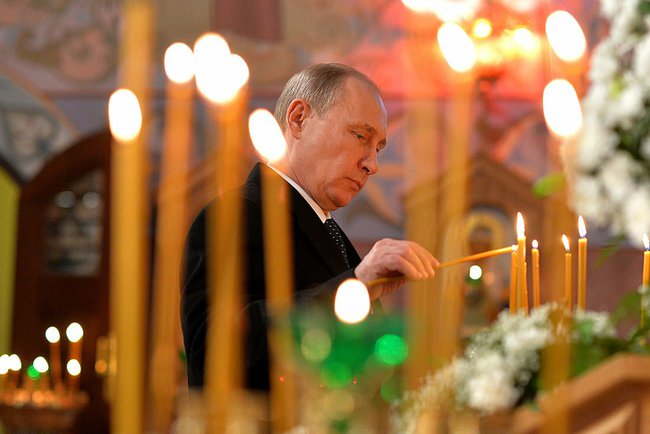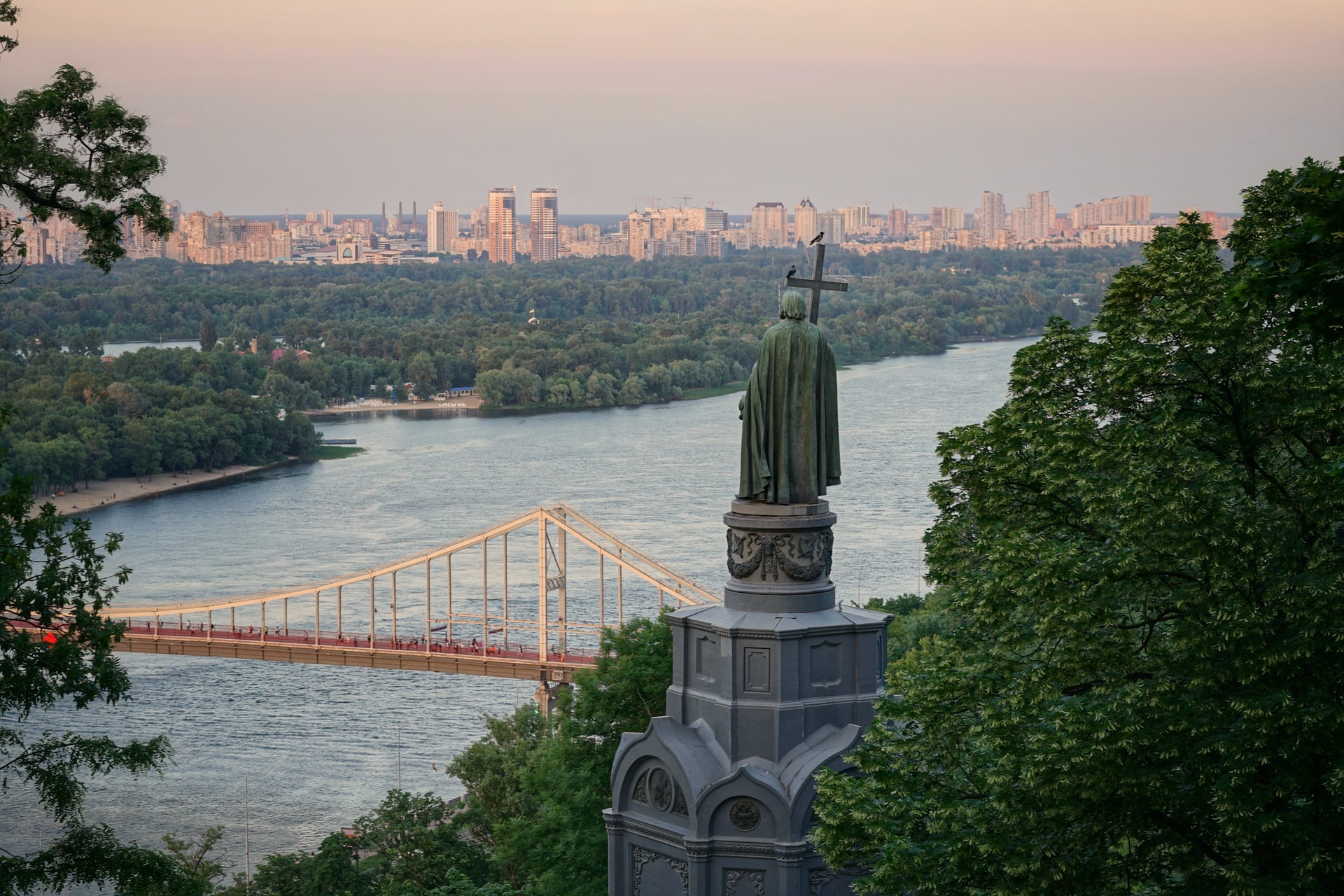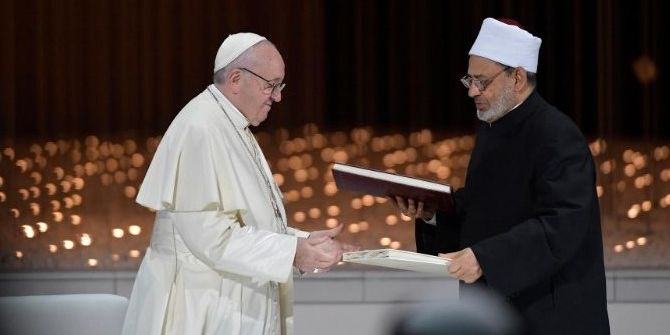For the last two weeks, the world has chronicled the actions of Russia’s invasion of Ukraine, along with the worldview of Vladimir Putin that led to it. This worldview, as explained in earlier blogs, is deeply imbedded in Putin’s understanding of his own religion. Fuelled by religious interpretations, Putin also has an ally in the Moscow Patriarchate – Patriarch Kirill. In this post originally published in euobserver, Dr Stephen Minas explains the involvement of the Patriarch in the war and the religious and legal implications of Kirill’s actions.

As Russia’s brutal war of aggression in Ukraine has escalated, the head of the Russian Orthodox Church, Patriarch Kirill, has not said a word against Russian aggression. For Kirill, obedient to the Russian censor’s commands, there is no “war” in Ukraine.
Instead, in his first public statement following the Russian attack, Kirill could only “deeply empathise with everyone affected by this tragedy”, as though Ukrainians are victims of a flood or earthquake. Kirill’s voice matters as the head of Russia’s largest religious body – which claims Ukraine as its “canonical territory” – an which is deeply-intertwined with agenda of Vladimir Putin and that of his regime.
Kirill’s doublespeak on “the events taking place” is not just reprehensible – it could even amount to an international crime. This is because of the importance of religious propaganda and incitement in this war.
Kirill and subordinates have for years peddled claims of a conspiracy of persecution against the Moscow Patriarchate’s Church in Ukraine, following the grant of autocephaly (independence) to the Orthodox Church of Ukraine by the Istanbul-based Ecumenical Patriarchate.
The Patriarch has claimed to receive “a weekly report of those violations of the law, the suffering that people are experiencing … violence, beatings, fighting for churches”. Kirill’s de facto foreign minister, the department for external church relations chairman, Metropolitan Hilarion, has alleged a campaign “with the involvement of the authorities” of beatings and church seizures. His Church’s systematic propaganda campaign about Ukraine has been utilised in Putin’s justification for war.
In his 21 February speech on recognising the so-called Donetsk and Luhansk “people’s republics”, Putin parroted the Moscow Patriarchate’s propaganda: “Kyiv continues to prepare the destruction of the Ukrainian Orthodox Church of the Moscow Patriarchate…”
Kirill has long echoed Putin’s core claim underlying his war: denial of the existence of a distinct Ukrainian people. Both Putin and Kirill claim that Russians and Ukrainians are “one people”. Kirill again invoked this theory as Russia bombed Ukrainian apartment buildings and hospitals.
On 27 February, while offering perfunctory remarks about praying for peace, Kirill reiterated his familiar themes on Ukraine: “the present political situation in fraternal Ukraine” with “evil forces that have always strived against the unity of Russia” and the Russian Church (the so-called “Nazi junta”?). “God forbid that a terrible line stained with the blood of our brothers should be drawn between Russia and Ukraine” he continued (with no hint that anyone in particular is responsible for this bloodshed), adding a warning against giving “the dark and hostile external forces an occasion to laugh at us”.
He even specified that, in asking the Lord to “protect the Russian land against external enemies”, he includes Ukraine and Belarus in Russia, alongside “other tribes and peoples”.
Ukrainian defenders are battling Russian invaders but, according to Kirill, the conflict is actually between a mythically-united Rus people (“Rus” is the medieval entity from which both the modern Russians and Ukrainians descend), and “external enemies”. These powerful unnamed actors, according to Kirill, have been trying to force the residents of the Donbass to hold a “gay parade”.
On 3 March, the same day that Putin issued a clearly genocidal threat to “destroy this ‘Anti-Russia’ created by the West”, the Moscow Patriarchate circulated to its dioceses the text of a special prayer, “approved” by Kirill, to be read in its churches. This text reiterates the Russian World trope of the common baptism of the Rus people and asks for a “spirit of brotherly love”. It asks God to, “in a foreign language, scold those who want and take up arms against Holy Russia – forbid and subvert their plans”.
This war propaganda is intended to be read out in every Moscow Patriarchate church – including, grotesquely, those in Ukraine.
War-crime complicity?
It confirms that Kirill is in lockstep with Putin’s war rhetoric and further exposes the patriarch to accusations of active complicity in war crimes, crimes against humanity and genocide. Recognising Kirill’s complicity, a growing number of his bishops in Ukraine are refusing to commemorate the “patriarch of the military operation” in their church services, defying threats from Moscow.
The words of influential propagandists can have real impact. Recognising this, the International Covenant on Civil and Political Rights provides: ‘Any propaganda for war shall be prohibited by law’.
International courts and tribunals since Nuremberg have attributed individual criminal responsibility not just to direct perpetrators of atrocities but also to accomplices – those who “aid or abet”. A person who aids or abets others to commit war crimes, crimes against humanity or genocide can be held criminally responsible. This is codified in, for example, the Rome Statute of the International Criminal Court (ICC). With questions over jurisdiction and criminal intent, and in the absence of any binding precedent, it is impossible to say whether an international prosecutor would consider charges against Kirill.
It is however conceivable that a prominent regime ideologist who launches a barrage of inciting propaganda before and during a conflict could be charged with aiding or abetting perpetration of war crimes or inciting others to genocide. Ultimately, whether Kirill is guilty of international crimes is a question that only a competent court or tribunal could answer.
On 26 February, Ukraine launched proceedings against the Russian Federation in the International Court of Justice, alleging genocide. On 2 March the ICC Prosecutor decided to proceed with investigations into alleged crimes in Ukraine. Of course, the actual delivery of the authors of this war into the hands of international justice might be considered an even greater miracle than making a Breguet watch disappear.
In any reckoning with the criminal responsibility of the Putin regime, Kirill and his subordinates will not be near the top of the list. Nevertheless, there is no statute of limitations for war crimes and neither priestly status nor a cassock encrusted with expensive jewellery and metalwork can confer immunity from international laws. The European Union and member states must work to ensure that there is no impunity for Putin’s propagandists.
Note: This piece gives the views of the author, and not the position of the LSE Religion and Global Society blog, nor of the London School of Economics. A version of this article originally appeared in euobserver. More LSE commentary Ukraine and the global response can be found here.





